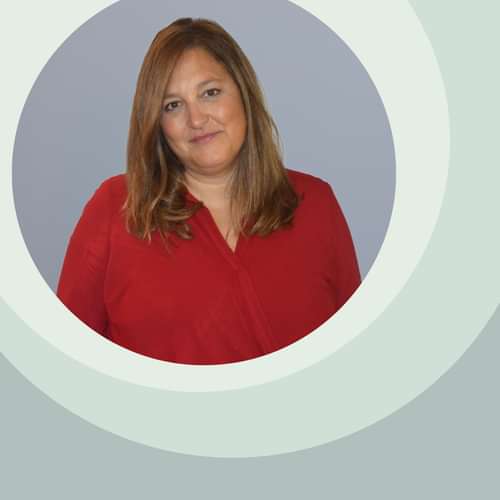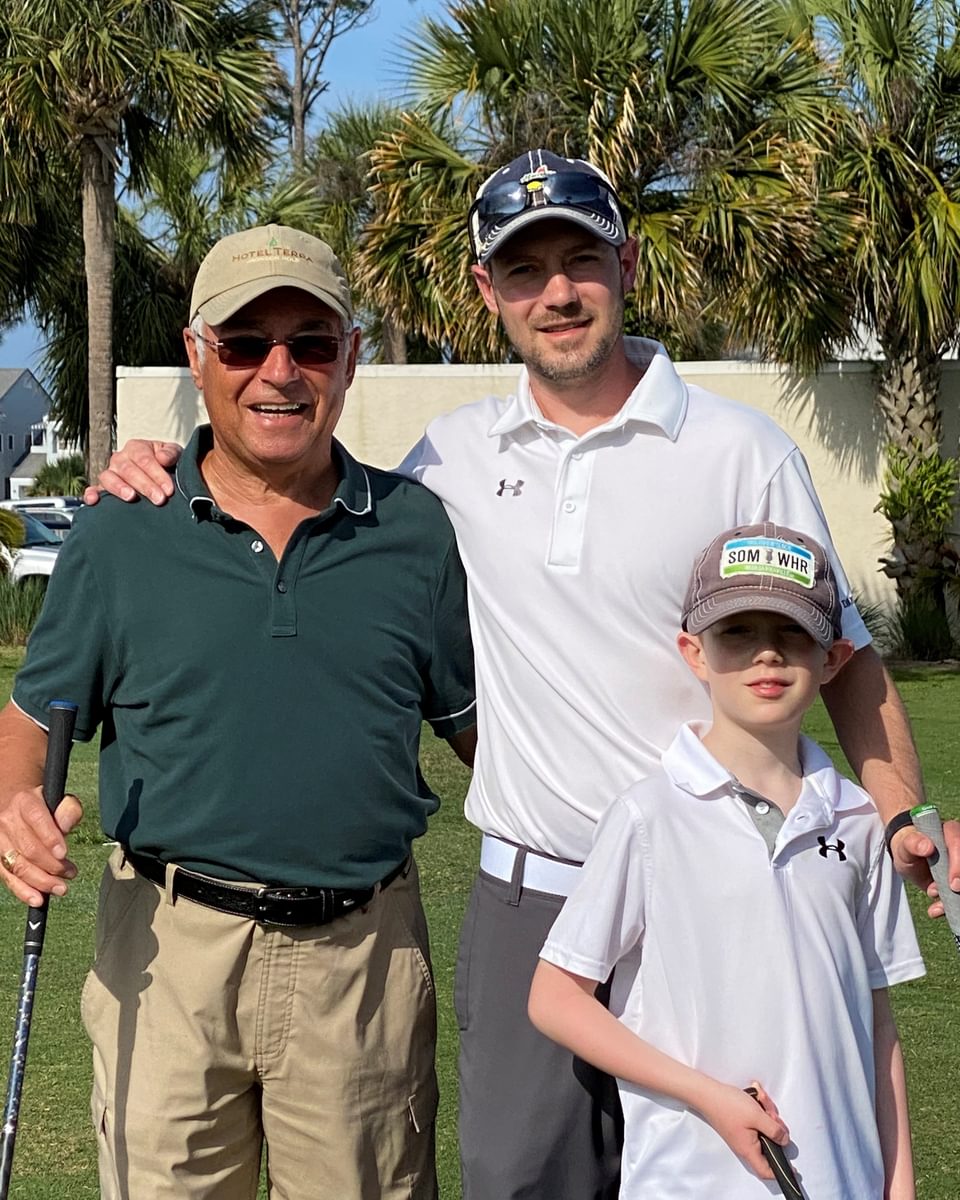
An Interview with Carmelle Giblin
David Philippi opens up about leading the family business, being a father, and balancing it all using 80/20.
David Philippi joined Strategex in 2007. Strategex was built by his father Peter Philippi – a man known for his charisma and vision. Though he had big shoes to fill, David has emerged as a leader in his own right. He has taken the reins of the company, produced growth, and successfully navigated the business through a global pandemic. He's an operations guru, but his greatest strength applies to all aspects of his life: his ability to see the best in people and empower them.
David holds the title of Chief Executive Officer, but he is much more than that. David carries the titles of devoted husband, ambitious son, and dedicated father. Balancing all the duties that come with these titles can be a daunting task. David does it with grace.
Strategex is a family business started by your dad. Paint a picture of your experience. Did you always know that you would join the family business? Was there any pressure to join?
When I was in high school, we were sitting at the dinner table. My dad (Peter Philippi) said, “Well, I’m going to leave the business to the three girls,” and I said, “Hey what about me?” and he said, “Nah…”
Coming to Strategex was not in my initial vision; it was not something that I was looking to do. In college, I earned an engineering degree, and I was out doing what most kids want to do, which is proving you can succeed on your own. In fact, until Strategex started the 80/20 practice, I was anti-consultant. In 2007, when my dad and Joe Hahn started the 80/20 practice, my dad invited me to an 80/20 seminar and I went. I was hooked! 80/20 really appealed to me.
When my dad asked me to join Strategex, I said, “Why would I want to do that? We’re great friends. We play golf together...Why would we ruin that with a business relationship?” However, Strategex has only strengthened that relationship rather than detracted from it.
The only pressure I feel is really self-inflicted. He has entrusted me with his greatest asset, and I want to make sure that I don’t mess up a wonderful thing. My job is to continue his legacy and what a legacy it is.
What is it like working with your dad, what is the good, the bad, and everything in between?
It’s interesting to see the different sides of each other at work. People are different outside of work, so I am able to experience “professional Peter” firsthand. Growing up with my dad I learned morals and how to be a better person. At work, he showed me how to be a leader and a better strategic thinker. He pushed me to think outside of the box. He trained me to think bigger, better, and broader.
The downside is sometimes I can’t shut off work, even on vacation. I remember last year (which was a tough year because of COVID) we were on vacation, and my dad and I started talking about work. I had to stop myself. I said, “I just can’t talk about work right now, this has to be a vacation, a time to unwind and unplug.” George Costanza had it right with his "worlds are colliding" theory, “You gotta keep your worlds apart.”
One difficult aspect is we don’t always see eye-to-eye in business. Naturally, there are some difficult conversations that come with the territory. As I was transitioning into CEO I had some ideas, my dad had some ideas, and they were not 100% aligned. I think the hard part of transitioning for him was giving up control, and that is one of the hardest things to do for anybody, especially in a business that you started from the ground up. The hard part for me is that I was trying to make my mark in the business.
There was an executive-level meeting, and I was new to the role of CEO. He tried to take the meeting in a different direction than I was trying to take it. Afterward, we discussed it. It may have gotten a little heated, but the point of the discussion was if I am going to be CEO then I’m going to have to make those decisions. If he steps in, takes authority, and makes the decisions, then what is the point? It was a hard but necessary conversation. I hope I was able to communicate that I respect him and his position, but we need to debate and align outside of meetings. In that room, if I’m CEO I have to be CEO. After we had that discussion, it was great; our relationship was good. We made some changes – I made some changes to what I was thinking, and he allowed me to take the reins. We leaned on our company values and made sure to check our egos at the door.
One of the things that my dad and I know is regardless of what happens in business, we still love each other unconditionally. Whatever happens in the business does not affect our personal lives. 80/20 reminds us that our relationship is the 80 and supersedes work.
In what ways has your dad, Peter, impacted your life?
He has impacted my life in so many ways that it would be easier to list the ways he hasn’t impacted my life. He is my dad, best friend, and mentor.
When you read the Strategex fundamentals, the first one is “Do the right thing, always.” Peter models this fundamental to his core. From an early age, my dad taught us to always do the right thing – not just with words but through his actions. One thing you can always say about Peter is he always does the right thing no matter the cost. When we were young, I was 6 or 7 years old, he lost his job because he stood up for what was right. He gave up everything he had because of what was right.
He is a phenomenal example to everyone! His actions truly match his values. And, he has so much love; he genuinely cares about people. I think the reason the Strategex culture feels like family is because of the foundation Peter laid of treating everyone with respect. I try to follow his example and be like him every day, but those are some big shoes to fill.
Your dad is a charismatic leader what is it like to follow in his footsteps? Do you lead differently than him or very similar to him?
There was a point before I became CEO when I thought, “I don’t think I can be the CEO.” He’s an extrovert, I’m an introvert. He’s a great salesperson with a bigger-than-life personality, and I’m an engineer, I’m more operational. With Peter, what you see is what you get, and he has something about him that can win over anyone. He can sell anybody anything. What I realized was I couldn’t be Peter but I could be the CEO. I’d have to lead in my own way.
For me, I am more of a quiet, pensive leader. My goal is to earn the trust of the team and work to empower them to be great. So, I think we just have completely different styles. I think both of our leadership styles are effective. We learned at a family business course at Northwestern that our different styles balance each other, and after a visionary like Peter, it’s essential for an operations guy like me to step up.
One thing we have in common is something I learned from him: servant leadership. We do whatever it takes for the people of the company. I think servant leadership is great to demonstrate to the team – I want everyone to see that dedication starts at the top. I want the team to understand that we work for each other, and with each other. We all work for everyone in the company, and that starts with the CEO.
You’re a very dedicated father, and you definitely put your family first. Tell us a little bit more about your children. What is one thing that makes them each special?
They are each so unique in their own way.

My oldest son Andrew is autistic. I’m no expert on autism, but I am aware of all the stereotypes including the notion that autistic people don’t feel. That stereotype never sat right with me, so I did some research. I read an article that really spoke to me. It explained it is not that autistic people don’t feel, it’s that they feel so deeply. They develop defense mechanisms to protect themselves from feeling so intensely, so some can be perceived as a little bit aloof. That’s Andrew. But, he’s special because he thinks differently and he loves differently. No matter what I’m working on he always wants to help - with the car, the office, everything. And, I appreciate our conversations. Conversations with somebody neurotypical are not necessarily conversations you can have with an autistic person. What he says is what he means; there is no sarcasm and there is no double entendre. I think that these conversations are great because everything that he is saying is 100% real.

Kaitlynn is super-smart and super-loving. She is very artistic and always drawing pictures; I have her artwork throughout the office. She is also extremely determined. She is playing soccer and softball this year. She was not doing so well, and she had a little bit of an attitude. We had a discussion and I told her, “You cannot get mad at yourself if you do not try. The effort you put in is what you are going to get out.” That resonated with her. All of a sudden, she went from striking out every time and not throwing the ball to the coach coming up to us and saying, “Hey, where did that arm come from?” She decided to apply herself, the same thing in soccer. Now that she is trying, she scored two goals in the last game. She always wants to cuddle, hug, and play together. One of my favorite things about her is, when we say goodnight, we have fights over who loves each other the most. In my office, there’s a post-it note from her that says, “I love you more.”

Then we have Jason, our third born. He is feisty and fun. No matter what, he is going to be himself. He is who he is. When he wants to do something, he will do it and when he does not, he won’t. He has every Pokémon that ever existed memorized, but he cannot do his ABCs. If he wants to apply himself, he will do it. He is probably the cutest kid you have ever seen; he’s got curly hair and a fiery personality to match. At the end of the day, he just wants to spend time with the family – he loves playing UNO and camping in the basement with the family. What makes Jason special is he is authentically himself. You know what you are going to get. And he is only five. He is still coming into his own.
What is it like being a father of young kids, a husband, and a CEO?
Well, I’ll say that being a father is the hardest of the jobs. All these roles are very time-consuming and demanding. I think the roles I play are extremely stressful, but also fun and rewarding. They really balance each other out. Fortunately, I have more bad days at the office than I have at home. Even when I have a bad day at the office I get to come home to my family and let the stress melt away.
How have your children impacted your career?
I learned to be a better leader in my profession because of my children. All three of my children are very different, and I learned that there's a different way to handle each person.
With Drew and his autism, we have to think differently, because his brain just does not work the same. He is different, but he is brilliant. He's made me more flexible and able to work differently with everyone’s personalities and approaches. I’ve learned to figure out what makes people go, to figure out how they’re thinking, their personality, where they thrive, and how to empower them. We have 35+ professionals here at Strategex and no two are the same. What I had to realize – and Drew has taught me – is that I need to treat everyone differently. My job is to help people flourish within their strengths. I must treat our employees differently to be the best version of themselves.
Having kids has taught me to embrace and empower people’s differences. If you allow someone to be themselves at work, they will flourish, and engage.
If you can pick one thing that you hope your children learn from you, what would it be?
If there is one thing that I would want them to learn is the true meaning of love: to love other people and be kind. The definition of love is giving up your own needs for the needs of others. I would want them to treat everyone that way. To put everybody else in front of themselves. Treat everybody, regardless of who they are, with the utmost care and kindness. When people look at my kids, I want them to say, "Those are people that really take care of others and really put other people first."
How do you balance work and family?
I make sure to prioritize family first. I received good advice from Joe Hahn, who is a fellow 80/20 guy that works at Strategex. He said,
“Dave, work will always be there, but if you neglect your family, they may not be.”
I make sure to prioritize the important things with the family. This means I do a lot of work when the kids are sleeping. Of course, it’s nice when I can combine work and family. For example, I’ve taken my kids on business trips and we’ve done some fun things during the trips. I might need to go meet a client, so we hop in the camper, and go camping wherever that client may be. I go from the campsite to work, then back to the campsite.
I cannot do it all without a wonderful support system at home, especially my wife Erica. She has sacrificed so much; she chose to give up her career temporarily to allow me to do the job that I do. We are lucky to be able to do this. She’s amazing and I probably do not give her enough support throughout the day (but I am working on it). If there were no Erica, there would be no David Philippi, CEO.
How has working from home affected your family life?
The pandemic was a blessing in disguise when it came to family time. My commute from the home office to the kitchen was two seconds rather than an hour each way to the main office. I was home for every family meal because we were not traveling, so I never missed out. I would have lunch at home so I could play Uno with my son, or we would wrestle in the basement. That really took off some of the stress of the day and broke up the monotony of Zoom meetings.
On the flip side, my kids did not always understand that I was working when I was home during the day. I would be on a call, and they would come in the office, and say “Hey dad! What’s going on?” There was one instance when I was doing a webinar, and I had to step out for a moment. I did not realize that while I was gone, my son had sat in my seat and was waving at everyone. The joke when I came back was that they thought I had grown when I left (they were just making fun of my size).
What advice would you give young professional fathers?
I’d pass along Joe Hahn’s great advice: Work will always be there, your family may not. Spend time with your children. Make sure you separate the stress of work from home life. Be very patient. Learn from your kids. Nothing replaces quality time; that’s what they remember.
I was talking to one of my mentors, and I said “Man, it’s really hard to leave them. I had to go on this trip and the kids were crying, they did not want me to go.” And he said, “You know, the way you know you’re doing a good job is that they don’t want you to go.” Make sure you spend the time so that your kids want you to stay.
The demands of your career may be hard but there is no greater role in life than being a father. In my opinion, if you’re the most successful businessman but you fail your kids, you’ve failed at life. Don’t fail your children.
Tell us how 80/20 has impacted your personal life.
It goes back to realizing what is important. For me, it’s being there for the big events. There was one instance that I will never forget. Andrew was having a choir concert, the “Spring Sing.” I did not realize what a big deal it would be, but I changed a meeting so I could attend. When he saw me in the crowd his eyes just lit up! At night all he repeated was, “Dad, you came!” Things like that may not seem so big, but it means the world to the kids. They are my 80s, so what’s important to them is important to me.
Another story about how 80/20 impacted my life was when Drew was 7 years old. I had to fly from Chicago to Tennessee for a client meeting that started on Monday at 9 am. At first, I thought about flying out Sunday night so I could be there in the morning. Then I thought about 80/20 and said to myself “You know your family is your 80 so, why don't you spend more time with them?” I had to get out the door before the sun came up, but I took the flight Monday morning. That night, Andrew woke up screaming and I ran into the room. He had a nightmare and was scared so I calmed him down and got him back to sleep. I woke up at 3 am to take the flight. As I was driving to the meeting, I checked in with my wife. She said, “Drew ran in the room, and he said, ‘Daddy rescued me last night!’” Because of 80/20, I chose to take the early flight in the morning, and because of that, I got to rescue my son. That was worth all the missed sleep.
Our clients have told us about what 80/20 has done for them; it has impacted more than their business. Our clients transform their businesses and transform their lives. They realize what life’s all about. Often, when we wrap up our 80/20 training we advise, "Avoid the death bed reckoning of Sam Walton." Sam Walton's final words were “I blew it.” He was the richest man in America at the time of his death but he didn’t know his youngest child, his marriage became one of contract and convenience, and he didn’t know any of his grandchildren, all because he was overly obsessed with work. He said “I blew it” because all the money in the world could not buy a relationship with his family. So don’t blow it. 80/20 is a way to take control of your time and focus on the things that matter. Get rid of the things that aren’t important and go spend that time with the people that matter -- they’re the ones that love and need you.
What are your plans for Father’s Day?
We are going on a big RV trip with my dad over Father’s Day. We are going to do Mount Rushmore, Grand Tetons, Yellowstone, and Glacier Park. We will be having fun together, making memories, camping, hiking, boating, and enjoying life.
-
David Philippi is CEO of Strategex. His expertise includes 80/20 execution, product development, and market analysis to drive profitability.
 Connect with David
Connect with David
Do the Right Thing, Always
25
Strategex culture and values are represented by 25 fundamentals. We live them. We breathe them. We succeed by them.

An Interview with Carmelle Giblin

An Interview with Carmelle Giblin

Invest in Relationships

Invest in Relationships

How to Fire Your Customers

How to Fire Your Customers
Contact us to see how we can help your business today.
Never miss a beat. Get our latest insights in your inbox.